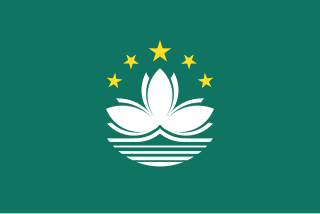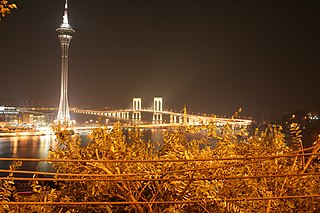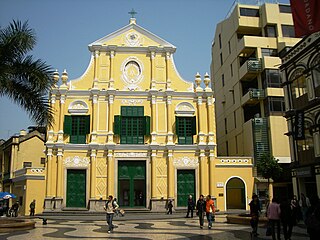Contents
| |
| Decades: |
| See also: History of Macau |
Events from the year 1998 in Portuguese Macau . [1]
| |
| Decades: |
| See also: History of Macau |
Events from the year 1998 in Portuguese Macau . [1]

Macau or Macao is a special administrative region of the People's Republic of China. With a population of about 710,000 people and a land area of 32.9 km2 (12.7 sq mi), it is the most densely populated region in the world.

Transport in Macau includes road, sea, rail and air transport. Road transport is the primary mode of transport within Macau, although a new rail system opened in December 2019 serving the areas of Taipa and Cotai. The main forms of public transport are buses and taxis.

The Ruins of Saint Paul's are the ruins of a 17th-century Catholic religious complex in Santo António, Macau, China. They include what was originally St. Paul's College and the Church of St. Paul also known as "Mater Dei", a 17th-century Portuguese church dedicated to Saint Paul the Apostle. Today, the ruins are one of Macau's best known landmarks and one of the Seven Wonders of Portuguese Origin in the World. In 2005, they were officially listed as part of the Historic Centre of Macau, a UNESCO World Heritage Site.

Taipa is an area in Macau, connected to Coloane through the area known as Cotai, which is largely built from reclaimed land. Located on the northern half of the island, Taipa's population is mostly suburban. Administratively, the boundaries of the traditional civil parish Freguesia de Nossa Senhora do Carmo are mostly coterminous with that of the former Taipa Island, except for a portion of the parish that lies on the island of Hengqin (Montanha), housing the campus of the University of Macau.

Coloane is the southernmost area in Macau, connected to Taipa through the area known as Cotai, which is largely built from reclaimed land. Known as “Lou Wan” in Cantonese, Coloane forms the southern part of Macau. Its population consists of several settlements dotted around the parish, such as Vila de Coloane, Hac Sa, Ká-Hó, and Cheoc Van. Administratively, the boundaries of the traditional civil parish of São Francisco Xavier are coterminous with that of Coloane.

Sé is a southeast civil parish in the Macau Peninsula of Macau. It is the second largest peninsular district in Macau after the civil parish of Nossa Senhora de Fátima. The parish area is named for the Igreja da Sé.
Macau is an autonomous territory within China. A Portuguese colony until 1999, Macau has a diverse culture firmly rooted in Cantonese culture, with a mix of influences from East Asia and Western Europe. Macau is known for being the largest gambling center in the world.

Tourism is a major industry in Macau. It is famous for the blend of Portuguese and Chinese cultures and its gambling industry, which includes Casino Lisboa, Macau, Sands Macau, The Venetian Macao, and Wynn Macau.

The Fortaleza do Monte is a fort in Santo António in Macau. It is the historical military centre of Macau. The fort forms part of the "Historic Centre of Macau" and is a UNESCO World Heritage Site.

The Macau Grand Prix is an annual motorsport road racing event for automobiles and motorcycles held on the Guia Circuit in Macau. The event includes the Formula 3 Macau Grand Prix and Macau Motorcycle Grand Prix title races, with other races for touring, grand touring, sports and Formula 4 cars.

The Macau Scientific and Cultural Centre, endowed with administrative autonomy and individual capital, is a public institute integrated within the internal administration of the Portuguese state, under the supervision of the Ministry of Science, Technology and Higher Education. The centre's mission is to produce, promote and disseminate knowledge about Macau as a platform between Portugal and the People's Republic of China, as well as between Europe and Asia. The centre is also a forum dedicated to studying and teaching the Chinese language and China's culture and history, and a centre for scientific research and ongoing and advanced training, on international relations between Portugal and China, and between Europe and Asia. The centre was created in 1995 by the initiative of the government in Macau in cooperation with the government of Portugal, and was inaugurated in 1999.

The Macao Museum is a public museum located on the hill of the Fortaleza do Monte in Santo António, Macau SAR. The museum presents the history of the city and territory of the former Portuguese colony of Macau, now a special administrative region of the People's Republic of China.
Macau residents participate in a wide variety of sports for recreation and competition. Football, basketball, volleyball, Dragon Boat, jogging, swimming, table tennis, and badminton are among the most popular in the community. Local leagues and competitions are organized regularly every year, but owing to Macau's small population professional leagues are financially unfeasible and so most participants are merely local sport enthusiasts.

The handover of Macau from the Portuguese Republic to the People's Republic of China was at midnight on 20 December 1999. This event ended 442 years of Portuguese rule in the former settlement, which began in 1557.

Macau Post and Telecommunications, most commonly known as CTT, is an entity under the Government of Macao responsible for postal services and telecommunications regulation.

Saint Dominic's Church is a late 16th-century Baroque-style church that serves within the Cathedral Parish of the Roman Catholic Diocese of Macau. It is in the peninsular part of the city at the Largo de São Domingos, near the Leal Senado Building.
Events from the year 1999 in Macau.
Events from the year 2006 in Macau, China.